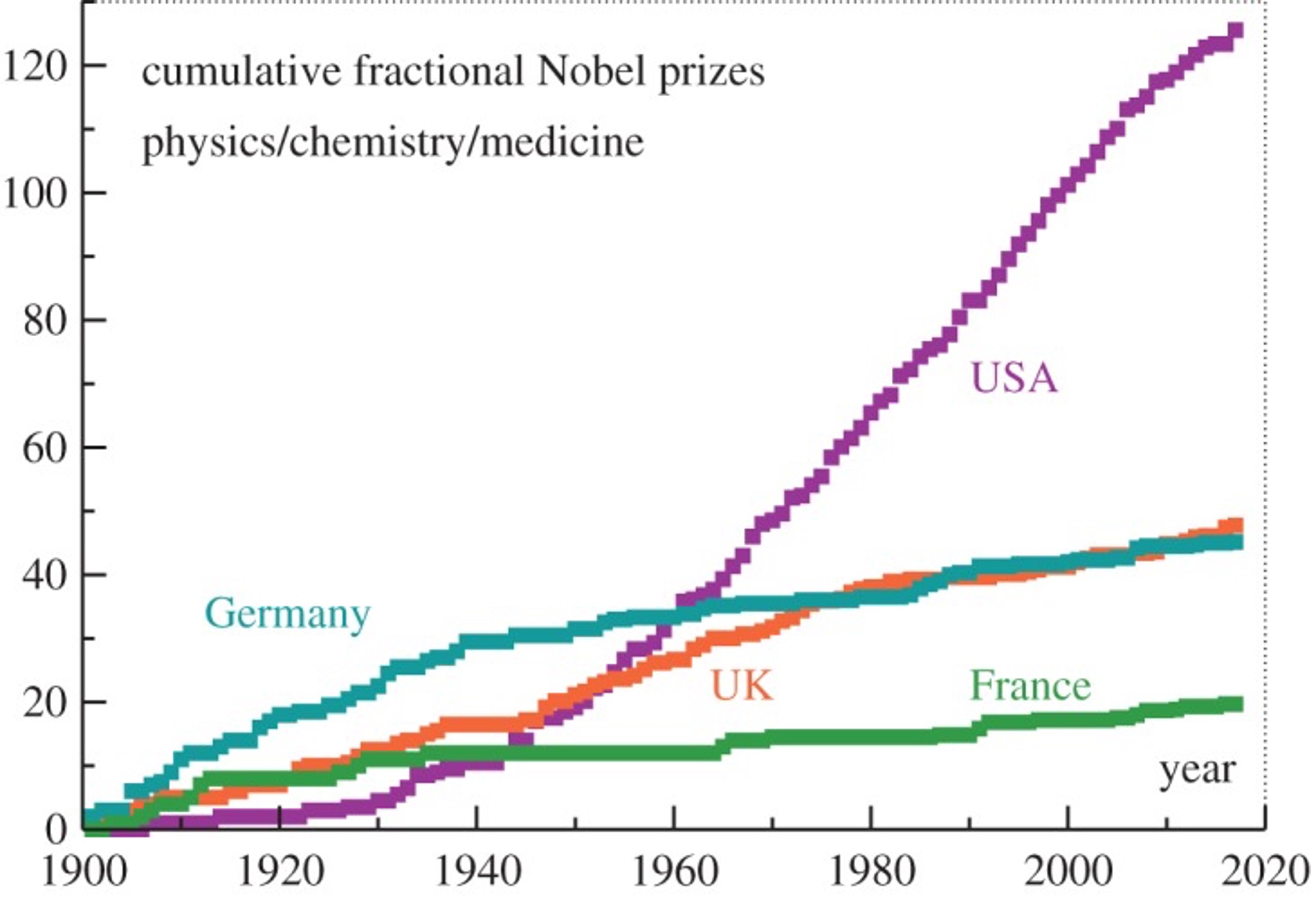
Published 2021-09-09
Keywords
- History of science,
- American science,
- European science,
- Nobel prizes,
- Basic research
How to Cite
Copyright (c) 2021 Jack Cohen

This work is licensed under a Creative Commons Attribution 4.0 International License.
Abstract
The US lagged behind the European powers, Germany, Britain and France, in scientific research and development at the beginning of the 20th century. Why this occurred and how Germany and Britain supported their flourishing scientific research cultures are discussed. The first serious expansion in basic scientific research in the US occurred with the influx of European Jewish scientists fleeing Nazism in the 1930’s. They specifically brought with them knowledge of atomic physics. The influence of Vannevar Bush, who was Director of the Office of Scientific Research and Development during World War Two proved crucial for the expansion of civilian research and development after the War, supported by the Federal Government. Also after the War, Operation Paperclip brought German scientists to the US and they had significant influence on developments in aeronautics, rocketry and space exploration.
References
- David Greasley, Les Oxley, Comparing British and American Economic and Industrial Performance 1860–1993: A Time Series Perspective, Explorations in Economic History 35 171-95, 1998.
- Gavin Wright, The Origins of American Industrial Success, 1879-1940, The American Economic Review 80 651-68 1990.
- David F. Schmitz, Henry L. Stimson: The First Wise Man. Rowman and Littlefield, 2000.
- https://carnegiescience.edu/about/history
- G. P. Zachary, Endless Frontier: Vannevar Bush, Engineer of the American Century. Free Press, 2018.
- in Book The New Century, ed., ed. by Editor, City, Chap. Chapter.1900
- Paul Israel, Edison: A Life of Invention. Wiley, New York: , 1998.
- Thomas Edison, https://quoteinvestigator.com/2012/04/10/, 1880.
- Tom McNichol, AC/DC: The savage tale of the first standards war. John Wiley, 2006.
- Erik Larson, Devil in the White City. Crown Publisher, 2003.
- https://en.wikipedia.org/wiki/List_of_Nobel_laureates_by_country.
- Claudius Gros, An empirical study of the per capita yield of science Nobel prizes: is the US era coming to an end?, R Soc Open Sci. 5, 2018.
- Philip Gummet, Scientists in Whitehall. Manchester Univ. Press, 1980.
- History of the Kaiser Wilhelm Society.
- Margit Szöllösi-Janze, Science and social space: transformations in the institutions of "wissenschaft" from the Wilhelmine Empire to the Weimar Republic, Minerva 43 339-60, 2005.
- The origins of the Notgemeinschaft, https://www.dfg.de/en/dfg_profile/history/notgemeinschaft/index.html, 2014.
- Mark Walker, Karin Orth, Ulrich Herbert, Rudiger vom Bruch, The German Research Foundation 1920-1970: Funding Poised between Science and Politics. Franz Steiner Verlag, 2013.
- https://www.reichstagsprotokolle.de/en_index.html
- Report, The Rockefeller Institute For Medical Research, Journal of the American Medical Association XXXVI 1630, 1901.
- https://carnegiescience.edu/about/history
- https://carnegiescience.edu/news/cliffs-mercury-named-carnegie-research-ship
- F.H. Portugal, unpublished ms
- H.G. Wells, The Land Ironclads, in The Short Stories of H.G. Wells, Ernest Benn, pp. 115-38.1974,
- James McWIlliams, Amiens: Dawn of Victory. Dundurn, 2001.
- https://en.wikipedia.org/wiki/History_of_the_tank
- https://en.wikipedia.org/wiki/Military_production_during_World_War_II
- Petra Moser, Alessandra Voena, Fabian Waldinger, German-Jewish Emigres and U.S. Invention, Social Science Res. Network https://papers.ssrn.com/abstract_id=1910247, 2013.
- Andy Marino, A Quiet American: The Secret War of Varian Fry. St. Martin's Press, New York, 1999.
- Peter Eisner, Saving the Jews of Nazi France, Smithsonian Magazine March, 2009.
- Daniel A. Gross, The U.S. Government Turned Away Thousands of Jewish Refugees, Fearing That They Were Nazi Spies, Smithsonian Mag. Nov. 18, 2015.
- Robert Millikan, Presentation in the Biltmore Hotel to the Society of Arts and Sciences, Brooklyn Life, 1929.
- https://www.atomicheritage.org/key-documents/einstein-szilard-letter.
- Carol A. Clark, What If The U.S. Had Invaded Japan On Nov. 1, 1945?, Los Alamos Daily Post Oct. 27, 2019.
- William Craig, The Fall of Japan: The Final Weeks of World War II in the Pacific. Openroad Media, 2015.
- John Peyton, Solly Zuckerman: A Scientist out of the Ordinary. J. Murray, London, 2001.
- Michael Frayn, Historical drama, Copenhagen, 1998.
- Vannevar Bush, Science the Endless Frontier: A Report to the President by Vannevar Bush, Director of the Office of Scientific Research and Development, National Science Foundation. , July 1945.
- B. Johnston, S. Webber, As We May Think: Information Literacy in the Information Age, Research Strategies 20 108-21, 2006.
- M. Ildirar, M. Osmen, E. Iskan, The Effect of Research and Development Expenditures on Economic Growth: New Evidences, International Conference on Asian Economies 36-43, 2016.
- D. Lederman, L. Saenz, Innovation and Development around the World, 1960-2000, World Bank Policy Research Working Paper 3774, 2005.
- O. Ozden, Evaluating the impact of R&D expenditures on GDP per capita, A Panel Data Study for OECD countries 2017.
- Annie Jacobsen, Operation Paperclip: The Secret Intelligence Program that Brought Nazi Scientists to America. Back Bay Books, 2015.
- Victoria A. Harden, WWI and the Ransdell Act of 1930: A Short History of the National Institutes of Health, Office Of History National Institutes of Health, 2011.
- George T. Mazuzan, The National Science Foundation: A Brief History, NSF Publication 8816.
- GJ. Hather, W. Haynes, R. Higdon, N. Kolker, EA. Stewart, et al, The United States of America and Scientific Research, PLOS ONE 5 e12203, 2010.




